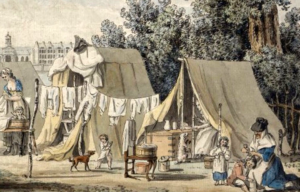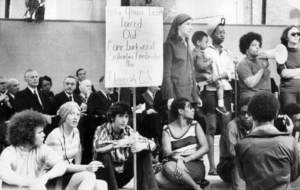On A Certain Deplorable Tendency Among The Most Respectable Members Of The Community To Abstain From Church-going— As Observed In The Year 1796 (Part One of Two)
By Prescott Evarts, 1922
There has recently come into the possession of the Cambridge Historical Society, as a gift from Rev. Henry Wilder Foote, a copy of “An Address to the Public from the Ministers of the Association in and about Cambridge, at their stated meeting on the second Tuesday in October, 1796.” The first part of the Address begins with an elaboration of the opening sentence, “All wise legislators, from the earliest times have acknowledged the importance of religious principles to the well-being of civil society”; and later occurs the sentence, “Those purposes cannot be more effectually promoted than by a due sanctification of the Sabbath.”
The latter part of the Address emphasizes the growing disregard of Sunday, with an appeal to the men of wealth and standing in the community as well as to the “middling and lower classes,” to the better observation of the day. “In every town and parish the citizens of distinction, were they to unite their influence, might be able to secure a general respect for religion. It is a melancholy reflection that any of these should have been foremost in setting the opposite example, and rendered themselves distinguished in the places where they live, for their practical contempt of the Sabbath, and neglect of public worship.”
This Address is signed by eleven ministers, pastors of parishes in and about Cambridge, and members of the Association. They were Samuel Kendal, minister of the Church at Weston, ordained 1783, died 1814, aet. 61 years; John Foster, ordained minister of the Church at Brighton, 1784, died 1829, aet. 66 years; Thaddeus Fiske, ordained minister of West Cambridge 1788, dismissed 1828, died 1855, aet. 93 years; Jacob Gushing, ordained minister of the Church at Westham (later a part of Watertown) 1752, died 1809, aet. 79 years; Jonas Clark, ordained minister of the Church at Lexington 1755, died 1805, aet. 75 years; David Osgood, ordained minister of the Church at Medford 1774, died 1822, aet. 76 years; Charles Stearns, ordained minister of the Church at Lincoln 1781, died 1826, aet. 74 years; Richard R. Eliot, ordained minister of the Second Church at Watertown 1780, died 1818, aet. 67 years; William Greenough, ordained minister of West Newton 1781, died 1831, aet. 76 years; Abiel Holmes, minister of the First Parish in Cambridge; and Jonathan Homer, ordained minister of the First Church in Newton 1782, died 1843.
This Association of Ministers in and about Cambridge appears to have been a semi-official body in the organization of the Congregational Churches in Massachusetts. There was an association of ministers in Boston, and an association of ministers in and about Salem. As is observed from this Address, they held stated meetings. From such inquiries as I have made, I have not been able to ascertain the date of their origin, but they would appear to have existed early in colonial times. In later years there were similar associations of ministers among the orthodox Congregationalists, which had some power of veto upon the choice of a minister for a congregation within their district. A law of the Province of Massachusetts Bay in 1695 gave authority to the ministers of a given locality to pass under certain conditions on the settlement of a minister. “When at any time a Church shall make choice of a Minister, and present their choice unto the Inhabitants of the Town or Precinct in a Publick meeting duly warned and assembled for that purpose, to have their concurrance therein; and the Inhabitants so Assembled, shall by a major Vote deny their approbation of the Churches choice; the Church may call in the help of a Council consisting of the Elders and Messengers of three or five Neighbouring Churches. . . . And in case the Council shall notwithstanding approve of the said Election, such Minister accepting of the Choice, and setling with them, shall be the Minister of the Town or Precinct.”
These Associations of Ministers apparently had a considerable influence in their immediate communities; and often in theological questions, a given Association might hold a position, or prepare an exposition of doctrine or discipline, which should eventually affect all the Congregational Churches in New England. For example, what was called the Cambridge Platform had its origin in just such an Association as this, and it exerted a very positive influence in New England Congregationalism. But this was much earlier than 1796, and the authority and influence of the ministers was much greater than in the period of this Address.
The Association of Ministers in and about Cambridge, however, used such power of persuasion as they could to stem the tide of indifference “to the observation of the Sabbath.” And it is to be observed that they did not base their appeal upon the eternal welfare of the immortal souls of those who thus “forsook the Public Worship and desecrated the Day.” Rather they appealed to natural desire for stability and order of civil society, to the danger of uncontrolled elements of discontent and envy among the less educated and industrious in the community; and the motives appealed to were of a very earthly character, to bring the community back to a stricter observance of the Day. They did not venture upon a definitely religious or theological appeal, but chose a ground which they believed more likely to arrest the temper and thought of the time. “We are alarmed at recent practises among us tending to weaken, what in our esteem are the surest foundations of all our happiness: we refer to the profanation of the Sabbath, and the growing neglect of its religious duties. With concern and grief we witness, on the high roads, frequent travelling for pleasure and diversion on this day. By many persons, the Sabbath is evidently selected for these purposes. Some have the custom of making entertainments for their friends, of paying and receiving visits, while others are seen publicly prosecuting their worldly affairs on this day. God and religion are neglected by both, and their example tends to destroy all distinction between the Lord’s day and other days. Formerly such irregularities were restrained by legislative authority, and would be so still, perhaps, were the spirit of the Constitution of this Commonwealth duly preserved.”
As a matter of fact, the issuing of this address was a noteworthy symptom of the times. The year 1796 marked the close of a period in the religious history of Congregationalism in New England, of apathy and loss of interest in religious experiences and in the searching of heart of previous generations. To anyone who desired in brief space to follow the religious history of New England for two centuries and a half, I would recommend a course of lectures delivered by the Rev. Dr. George Leon Walker in 1896 before the Hartford Theological Seminary, with the title Some Aspects of the Religious Life of New England, with Special Reference to Congregationalists. In those two hundred and fifty years, Dr. Walker traces the varying periods of intense religious conviction and the reality of spiritual effort, widely exercised, followed by periods of formalism and indifference, accompanied by decadence in manners and the greater prevalence of moral offenses. Such a period followed the disappearance of the generation of the Pilgrims and their immediate associates. Again there was a distinct revival of religious interest at the time of what was called the Great Awakening in 1740, of which the outstanding event was the preaching of Whitfield, followed by an army of imitators. Whatever may have been the genuine religious benefit from the period of the Great Awakening, some of the results in the generation or two succeeding were, as was to be expected, of a contrary nature. The exaggerated appeal to emotion, the excessive and hysterical exhibition which accompanied many conversions, and the backsliding of others, led to distrust of religious experience and the religious appeal in the following generation. Moreover, after the Revolutionary War there were many questions which occupied men’s minds and drew upon their energies, and the interest in religion occupied a less important place. Political controversy and discussion usurped the place of theological. High taxes, a restricted currency, and other economic conditions, created a considerable unrest and discontent and turmoil. And furthermore, the French Revolution and the Age of Reason had a considerable influence over a large part both of the educated and uneducated members of the community.
The Address of the Cambridge ministers thus came at the very end of the period throughout New England, of a decline in religious observance, of indifference to religious and theological matters, and laxity in the observance of Sunday laws.
The year 1797 marked the beginning of a renewed interest in religion, starting first in Connecticut and spreading from there through other states of New England. This movement continued with changing emphasis till after the middle of the nineteenth century.
Of course, the Association of Ministers in 1796, in deploring the constant travelling on the Lord’s Day and the indifference to attendance at Church, had the law on their side, even though public opinion did not support the law.
We are all more or less familiar with some of the provisions “for the observation of the Lord’s Day, in the Province of Massachusetts Bay.” “An Act for the better Observation and Keeping the Lord’s Day” passed in 1692 begins, “All and every person and persons whatsoever, shall on that Day carefully apply themselves to duties of Religion and Piety, publickly and privately.” Then follows the provision that “no Tradesman, Artificer, Labourer or other person whatsoever, shall upon the Land or Water, do or exercise any Labour, Business or Work of their ordinary Callings; nor use any Game, Sport, Play or Recreation on the Lord’s Day, or any part thereof; . . . upon pain that every person so offending shall forfeit Five Shillings.” Further it is ordered and declared that “no Traveler, Drover, Horse-Courser, Waggoner, Butcher, Higler, or any their Servants shall Travel on that Day, or any part thereof, . . . upon the penalty of Twenty Shillings.” Then provision follows in regard to Vinters, Inn Holders, or other Persons Keeping a house of Public Entertainment. Finally the Law concludes “And all and every Justices of the Peace, Constables and Tythingmen are required to take effectual care, and endeavour that this Act in all the particulars thereof be duly observed; as also to Restrain all Persons from Swimming in the Water, Unnecessary and Unseasonable Walking in the Streets or Fields in the Town of Boston, or other Places, Keeping open their Shops, or following their Secular Occasions or Recreations in the Evening preceding the Lord’s Day, or any part of the said Day, or Evening following.”
This article originally appeared in the Proceedings of the Cambridge Historical Society, Volume 16 (1922).


